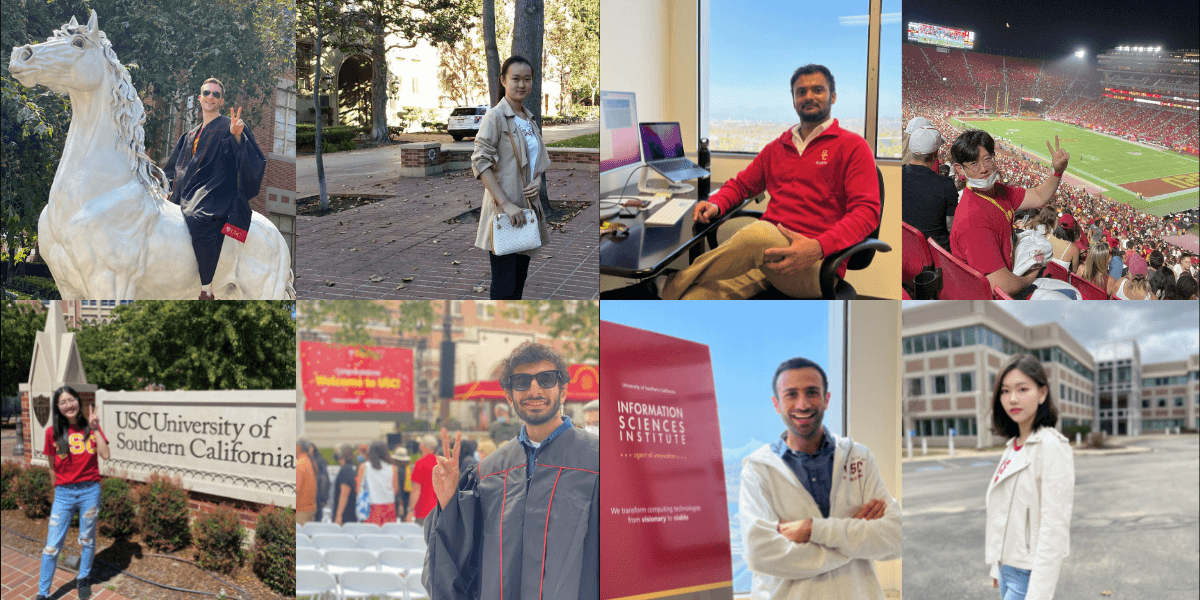“Splendid sunsets on the Marina”: USC ISI’s Class of 2022 is graduating with big dreams and fond memories

USC’s Information Sciences Institute (ISI) has an impressive Class of 2022, featuring undergraduate, graduate, and doctoral students from all over the world. These students, nearly all graduating from the USC Viterbi School of Engineering, had the opportunity to work and research at USC ISI, the university’s storied “crown jewel” research institute.
ISI’s 2022 graduating class features students from Wuhan China; Karachi, Pakistan; Novo Hamburgo, Brazil; Binh Duong, Vietnam; California, Japan, South Korea and India, to name a few.
For one of the graduating students, Thamme Gowda, this achievement is particularly meaningful: he is the first engineer from his Southern Indian village, near Bangalore. With his brand new Ph.D. in computer science, he even wonders if he is also the first doctor from his hometown — “not the medical type, though!” he admitted jokingly. When asked about the most impactful project he worked on at ISI, Gowda responded that he made a concrete impact: he expanded machine translation support to rare languages.
“While most competitors (including Google and Microsoft Translate) currently support only about 100 languages,” said Gowda, “I have created higher-quality translation models for up to 500 languages.”
Making an impact
The impactful projects were abundant for this year’s graduates. Jonathan Nguyen, who worked with supervisor David Barnhart and will be graduating with an M.S. in astronautical engineering, stated: “I was leading a team developing sensors that determine relative attitude and distance for satellite docking. We were able to secure a flight opportunity to the International Space Station for testing in microgravity.” He also has quite the anecdote: “There was a time when I used my packed jacket on a stick to poke at our test platform to simulate impulsive thrust of a spacecraft to guide it for docking, and it worked.” After graduation, Jonathan would like to work in spacecraft propulsion, hypersonic, or astrodynamics.
Sami Abu-El-Haija, who will graduate with a Ph.D. in computer science, spent a lot of his time at ISI initializing deep graph neural networks. His goal was to make the training process of graph neural networks faster by a significant amount without affecting their performance. The next step for Sami? He has already accepted, and started, a role as a research scientist at Google Research.
Others are also going to big tech companies, like Yuzi He, graduating with a Ph.D. in physics, who will join Meta as a research scientist upon graduation. Haoda Wang, with his bachelor’s in computer engineering and computer science, also has big dreams: “I worked at NASA-JPL for a bit, working with the flight software onboard Mars 2020. Building software for spacecraft like that would be pretty nice.” Hopefully, they will notice him through his out of the box ideas: “I wrote a blog post that analyzed whether a LEGO rocket could really fly, and it somehow got featured on Ars Technica,” recalled Wang.
Seungmin Lee, graduating with an M.S. in computer science, believes his most impactful project at ISI was, “working on how to leverage multi-layers storage, how data communication evolves with batch size.” Rehan Ahmed, who got his master’s in applied data science, spent his time at ISI detecting potential sources of vulnerabilities in open source code and figuring out a way to fix them. Minh Pham, Ph.D. in computer science, focused on automating the process of understanding, processing and cleaning tabular data.
ISI has inspired many students to explore different areas of research, and for Shen Yan, Ph.D. in computer science, her work at ISI even prompted her thesis. “I worked on an IARPA project named Tracking Individual Performance with Wearable Sensors (TILES) when I first joined ISI. TILES is a project focused on the analysis of stress, task performance, behavior and other factors pertaining to professionals engaged in a high-stress work environment. We design machine learning models to estimate human behaviors from sensory data. I learned a lot from the project and decided to make it my dissertation research.”
Sunset dreams and innovations
She also has plans to change how we communicate: “I would love to invent a tool or app that can help mimic more real, supportive human-to-human interactions. Even though we have a phone, video calls, messages, and many social platforms, remote connections still cannot provide sufficient companionship. For family and friends that cannot meet in person, we need a tool to provide them with better connections and mental support.”
For Yiwen Ma, M.S. in healthcare computer science, the sky is the limit when it comes to inventing: “I would love to create a time machine to allow one to travel through time and space, which bridges the distance and provides us more time to spend with family and friends.”
Other fond memories had little to do with research. Many students remembered the beautiful views from ISI’s Marina Del Rey office building and its breathtaking sunsets on the harbor. Matheus Schmitz, an ISI student who will be graduating with an M.S. in applied data science after working on a model to identify anti-vaccination users on Twitter, recalled his “first time in the office seeing ISI’s view of the marina.” Likewise, Akira Matsui, who is graduating with a Ph.D. in computer science, will have a hard time letting go of “the splendid sunsets on the beautiful marina” he got to witness while he was working on machine learning and human forecasting to predict geopolitical events. He shares the best advice he received during his years at ISI: “do your homework and be positive.”

Sunset in Marina Del Rey from the ISI building.
Erin Szeto, graduating with an M.S. in applied data science, also has some solid words of advice for anybody who would like to work in this field: “Your first round of code will never be perfect, and you will always be rewriting and improving your code. Talk to the rubber duck!” But the wisest words have to be those spoken to Jae Young Kim, who got his master’s in applied data science: “Focus more on the big picture: not the trees, but the forest.”
Congratulations to the Class of 2022, and thank you to our featured ISI students Thamme Gowda, Matheus Schmitz, Akira Matsui, Seungmin Lee, Erin Szeto, Jae Young Kim, Rehan Ahmed, Haoda Wang, Shen Yan, Yuzi He, Jonathan Nguyen, Minh Pham, Yiwen Ma, and Sami Abu-El-Haija. Fight On!
Published on May 9th, 2022
Last updated on May 16th, 2024